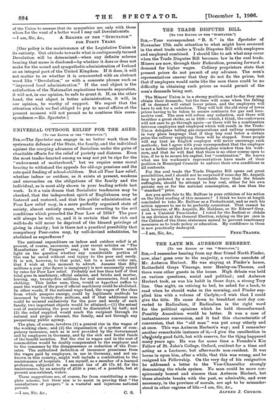THE TRADE DISPUTES BILL.
rm TILE EDITOR OF THE " Se Sal'ATOR:11 SIR,—Your correspondent "B. S." in the Spectator of November 17th calls attention to what might have occurred in the steel trade under a Trade Disputes Bill with employers and employed combined. I should like to ask what may occur when the Trade Disputes Bill becomes law in the coal trade. Miners are now, through their Federation, pressing forward a demand for higher wages. Colliery proprietors state that present prices do :not permit of any advance. The men's representatives answer that they do not fix the prices, but that if employers would unite like the men there could be no difficulty in obtaining such prices as would permit of the
men's demands being met.
The Miners' Union is in a strong position, and to-day they may obtain their demands; but the time will come when the falling off in demand will entail lower prices, and the employers will have to ask for a reduction. They will tell the old story of lower prices having to be taken to secure contracts for gas and loco- motive coal. The men will refuse any reduction, and there will be either a great strike, as in 1893—which, I think, the coalowners will not care to go through again—or there will be a combination between employers and employed which will result in the Trade- Union delegates telling gas corporations and railway companies in very plain language that if they buy coal below a certain price the colliery supplying them will be stopped. Some people will say that an English employer will never encourage such methods ; but I agree with your correspondent that the employer is not a better subject for a stained-glass window than his work- men, and that he will find that there is no other course open to him, if he is to secure his capital, but "combination." He knows what use his workmen's representatives have made of their position in Municipal Councils to enforce their own conditions in all contracts.
For the coal trade the Trade Disputes Bill opens out great possibilities, and I should not be surprised if some day Mr. Asquith may be picketed by a more formidable force than the female suffragists, should he attempt to buy coal, either for his own private use or for the national consumption, at less than the " standard" price.
Are you quite fair to Mr. Balfour in your criticism of his action on the third reading of this measure? I think we have at length concluded to take Mr. Balfour as a Protectionist, and as such his action appears to me to be perfectly consistent. That cannot be said, however, of Mr. Asquith, Mr. Haldane, or Sir Edwarfl Grey. I am a Unionist Free-trader. I voted for the Radical co Alidate in my division at the General Election, relying on the pre ance in the Cabinet of the three statesmen named to prevent reactionary measures as to trade policy or education. My confidence in them is now practically destroyed.






























































 Previous page
Previous page